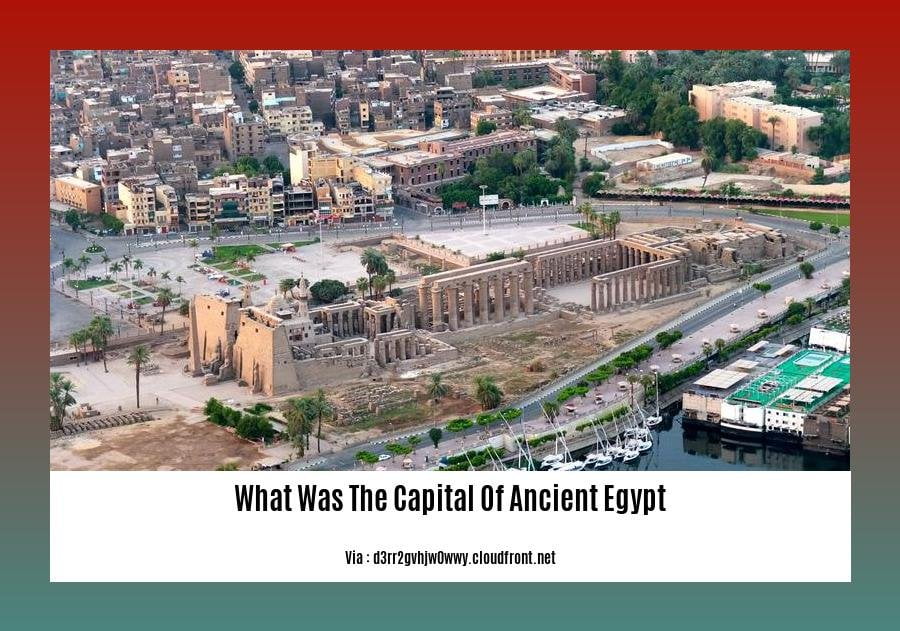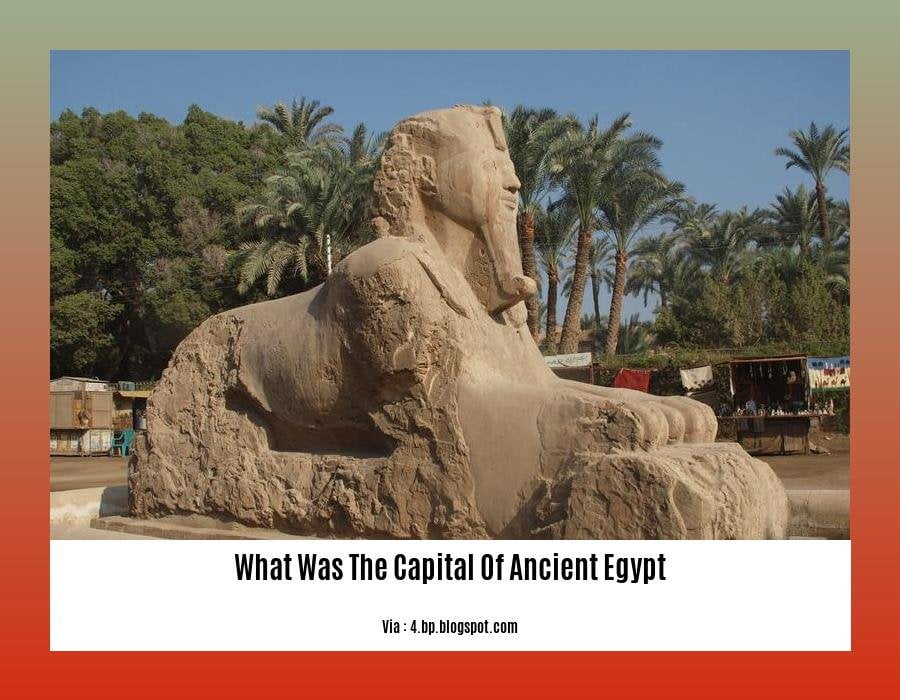Hey there, history buffs! Get ready to journey through the captivating saga of ancient Egypt’s capital cities. From the fertile banks of the Nile to the majestic temples of Thebes, each city played a crucial role in shaping this legendary civilization’s rise and fall. Let’s delve into the secrets and explore the shifting sands of power that defined ancient Egypt’s destiny.

What Was the Capital of Ancient Egypt?
When we envision ancient Egypt, with its magnificent pyramids and powerful pharaohs, one city likely comes to mind: Memphis. This bustling metropolis held the esteemed title of Egypt’s capital for a significant portion of its history, particularly during the Old Kingdom period.
Picture Memphis as the “New York City” of its time, a vibrant hub where politics and religion intertwined. Its strategic location, near the Giza plateau (home to the iconic Great Pyramid), made it the place for religious ceremonies, especially those dedicated to the revered god Ptah. For the people of Memphis, Ptah was a central figure, much like a patron saint.
However, just as empires rise and fall, so do cities. By the 27th Dynasty, Memphis found itself under the rule of the mighty Persian Empire. While it retained some importance, its star had begun to fade during the New Kingdom era, when Thebes, another powerful city, emerged as the new capital.
Even under the formidable Roman Empire, Memphis held its own as Egypt’s second city. However, time, as it often does, took its toll. The once-great city gradually declined, eventually becoming a source of building materials for its neighbors. Imagine that – the very stones that formed grand temples and palaces repurposed for humbler dwellings!
Unraveling the Mysteries of Memphis:
- The Enigma of Memphis’s Birth: The exact date of Memphis’s founding remains a historical puzzle, despite its fame. Researchers continue to piece together clues to solve this mystery.
- The Cult of Ptah: Ptah’s influence on Memphis was profound. Uncovering the intricacies of his worship and how it shaped the city’s religious landscape is an ongoing endeavor for historians.
- Lost Architectural Wonders: Memphis once boasted incredible temples, pyramids, and monuments, many of which have been lost to the sands of time. Archaeologists are tirelessly working to unearth these treasures and bring the splendor of Memphis back to life.
- From Metropolis to Ruins: The reasons behind Memphis’s decline after the Roman Empire offer valuable insights into the cyclical nature of civilizations. Tracing the city’s journey through time, from its powerful peak to its eventual fate, continues to fascinate historians.
While the title of “capital” may have shifted throughout ancient Egypt’s long history, Memphis’s legacy as a powerful and influential city remains a captivating chapter in this incredible civilization’s story.
What Was the First Capital of Ancient Egypt?
Ancient Egypt, a civilization that thrived along the Nile River, left an enduring mark on history. Its story, etched in stone and papyrus, narrates tales of powerful pharaohs and remarkable achievements. But where did it all begin? Which city had the honor of being Egypt’s very first capital? That would be the mighty Memphis.
Imagine a city pulsing with life, a central hub in the ancient world. That was Memphis – a symbol of pharaonic power and influence. This wasn’t merely a random choice; Memphis occupied a strategic location, ideally situated for ruling over a unified Egypt. For eight dynasties during the Old Kingdom period, it was the place to be. Pharaohs, believed to be descendants of the gods, ruled from Memphis, making decisions that shaped the ancient world. Trade flowed through its streets, diplomats arrived and departed, and religious ceremonies filled its temples. It was a vibrant melting pot of culture and power.
Like all good things, Memphis’s time as the top dog eventually came to an end. Thebes rose to prominence during the New Kingdom, and Memphis gracefully transitioned into a supporting role. Even then, it continued to play a significant role, even helping to prepare the future pharaoh Amenhotep II. During the Greco-Roman era, Alexandria, with its dazzling beauty and innovation, took center stage. Although Memphis may have been overshadowed, its legacy as ancient Egypt’s first capital remained strong.
Consider This:
| Time Period | Capital City | What Made it Special |
|---|---|---|
| Old Kingdom | Memphis | First capital, political and cultural heart of a unified Egypt |
| New Kingdom | Thebes | Rose to prominence while Memphis retained importance in a secondary role |
| Greco-Roman Era | Alexandria | A grand metropolis that eclipsed Memphis in importance |
It’s crucial to remember that our understanding of ancient Egypt is always evolving. Archaeologists constantly unearth new artifacts and piece together clues about the past, which means our current understanding might be refined with future discoveries. That’s the beauty of studying history – there’s always something new to learn!

What Were the Two Capitals of Ancient Egypt?
Ancient Egypt, a civilization spanning over 3,000 years, experienced its share of change. And what else changes over time? You guessed it – capitals! Just like countries today, ancient Egypt didn’t always have its capital in the same place. It actually shifted locations, with the two most famous capitals being Memphis and Thebes.
Think of Memphis as the Big Apple of the Old Kingdom period – roughly from 2686 to 2181 BCE. Situated in Lower Egypt, Memphis wasn’t just any city; it was the place to be. We’re talking major political clout, a flourishing economy, and a vibrant culture. And let’s not forget the jaw-dropping pyramids and temples they constructed – talk about leaving a mark!
Fast forward a few centuries, and Thebes, nestled in Upper Egypt, takes center stage. This shift occurred around 2055 BCE, during the Middle Kingdom period. Thebes wasn’t just a temporary replacement; it held onto that capital title throughout the New Kingdom, which ended around 1070 BCE. What made Thebes so special? Imagine a city pulsating with life, renowned for its awe-inspiring temples and tombs. Ever heard of the Valley of the Kings? Yep, that was all Thebes!
Even in a civilization as ancient as Egypt, things were not static. Capitals changed, power shifted, but the legacy of these incredible cities, like Memphis and Thebes, has endured.
Does Ancient Egypt Have a Capital A?
We’ve explored some intriguing facts about ancient Egypt, but let’s address a question that often arises: did this ancient civilization have a capital city that starts with the letter “A”? The answer, like many things in history, is not a simple yes or no. Ancient Egypt didn’t have just one capital throughout its entire existence. It passed through different periods, and with those periods came changes in power and, yes, even capital cities.
While no Egyptian capital city started with the letter “A,” Thebes holds a special place in understanding ancient Egypt’s rise and influence. Imagine a city teeming with activity, its streets filled with pharaohs, priests, and everyday people. That was Thebes, the illustrious capital during the New Kingdom, a period when ancient Egypt reached the pinnacle of its power.
Thebes wasn’t just a political center; it was a dynamic hub of religion and culture. Picture enormous temples dedicated to the Egyptian gods, towering structures that took generations to build. Two of the most famous, Karnak and Luxor, still stand today, attracting visitors from around the globe. These temples weren’t just places of worship; they were statements of power and architectural genius, showcasing the skill and artistry of the ancient Egyptians.
Walking among the ruins of Thebes today is like stepping back in time. Imagine the pharaohs who once walked those streets, the ceremonies conducted in the temples, the lives of the people who called this city home. It’s a poignant reminder of a civilization that, though long gone, continues to captivate our imaginations.
Of course, our understanding of ancient Egypt is constantly evolving. Archaeologists are always making new discoveries, and historians are reinterpreting old evidence. What we know for sure is that Thebes played a pivotal role in ancient Egyptian history, a city that, even without a capital “A,” continues to fascinate and intrigue us.
Key Points about Thebes:
| Feature | Description |
|---|---|
| City Name | Thebes |
| Time Period | New Kingdom |
| Significance | Capital city, religious center, cultural hub |
| Famous Temples | Karnak and Luxor |
If you’re interested in learning more about ancient Egypt, don’t stop here! Countless books, documentaries, and online resources are waiting to be explored. Who knows what other fascinating discoveries about ancient Egypt are still waiting to be uncovered?
What Was the Capital of Egypt Called?
We know that Egypt’s capital today is the bustling metropolis of Cairo. But rewind the clock a few thousand years, and the picture looks quite different! Throughout its incredibly long history, Egypt saw several cities rise to become its capital. Let’s travel back in time and explore these ancient powerhouses.
First, we have Memphis, established by the ambitious King Menes. Imagine this—it was the place to be way back in the Old Kingdom period, which began around 3100 BC! Memphis was a bustling hub for trade and religion, and its impressive monuments stood as a testament to the power of the pharaohs. Think colossal statues and towering pyramids – they weren’t kidding around!
As time marched on, the spotlight shifted south to Thebes. This city, with its awe-inspiring temples like Karnak and Luxor, took center stage during the Middle and New Kingdoms (roughly 2055 BC to 1070 BC). These weren’t just any temples, mind you—they were massive complexes dedicated to the gods, decorated with intricate carvings and towering columns. It’s no wonder Thebes became synonymous with the might and grandeur of the pharaohs! Some of the most famous rulers, like the powerful Hatshepsut and the legendary boy-king Tutankhamun, ruled from this magnificent city.
Then came a dramatic twist! Alexander the Great, the Macedonian king who conquered Egypt in the 4th century BC, established a brand-new city on the Mediterranean coast – Alexandria. This city was like a breath of fresh air, a melting pot of cultures, and a beacon of knowledge and learning. We’re talking about the Library of Alexandria, one of the largest and most comprehensive libraries of the ancient world, and the Lighthouse of Alexandria, one of the Seven Wonders of the Ancient World! Alexandria thrived as the capital under the Ptolemaic Dynasty, founded by one of Alexander’s generals.
Finally, we arrive at Cairo, our modern-day capital. Founded in the 10th century AD, Cairo has witnessed centuries of history within its bustling streets. From the majestic Al-Azhar Mosque, a center of Islamic learning, to the imposing Citadel, a medieval fortress that has seen it all, Cairo offers a captivating blend of the ancient and the modern.
In a Nutshell:
- Memphis, founded by King Menes, kicked things off as the capital during the Old Kingdom.
- Thebes, known for its magnificent temples, became the seat of power during the Middle and New Kingdoms.
- Alexandria, established by Alexander the Great, brought a taste of Hellenistic culture to Egypt.
- Cairo, our modern capital, stands as a testament to Egypt’s enduring legacy.
So, the next time someone asks you about the capital of Egypt, you can impress them with your knowledge of not just one, but four incredible cities that each played a pivotal role in shaping this fascinating nation’s history!
Was Alexandria the Old Capital of Egypt?
Was Alexandria ever the leading city in ancient Egypt? Well, the answer depends on the specific time period we’re talking about. If we’re thinking way back to the times of pyramids and pharaohs, then no, Alexandria wasn’t in charge. But fast forward to around 332 BCE, when a famous guy named Alexander the Great founded a city – you guessed it, Alexandria!
This city quickly gained immense importance, blossoming into a bustling metropolis. When Alexander the Great’s dynasty, the Ptolemaic Kingdom, took control of Egypt, they decided to make Alexandria their home base. This period, known as the Hellenistic period, saw Alexandria become a true powerhouse, not just in Egypt but throughout the Mediterranean world. Imagine a city buzzing with brilliant minds, groundbreaking discoveries, and a library so vast it would make your head spin – that was Alexandria in its prime.
This incredible city held onto its capital status even when the Romans arrived and eventually took control of Egypt. For several centuries, Alexandria was the place to be. It was a melting pot of cultures, a center for trade, and a beacon of knowledge, thanks in large part to the legendary Library of Alexandria.
It’s important to note that our understanding of Alexandria is constantly evolving. Archaeologists continue to uncover new discoveries, historians are piecing together ancient texts, and researchers are using cutting-edge technology to unlock the city’s secrets. What we know for sure is that Alexandria played a pivotal role in shaping Egyptian and even world history. While it wasn’t always the capital in the ancient Egyptian sense, it certainly left an indelible mark.
Was Thebes the Capital of Egypt?
The question of whether Thebes was the capital of ancient Egypt is a bit more nuanced than a simple yes or no. Thebes held immense importance for a long time, shining brightly at different points in ancient Egyptian history.
Thebes began to make a name for itself around 2040 BC, during the rise of the Middle Kingdom. The pharaohs of the 9th and 10th dynasties decided to make Thebes their home base, and that’s when things really took off. It became the place to be, both politically and religiously. This was further amplified by the prominence of Amun, the most important god at the time, and Thebes was his city.
However, Thebes’s golden age truly began during the New Kingdom. Pharaohs like Thutmose III and Ramses II, the rockstars of their time, poured their resources into making Thebes absolutely stunning. Imagine massive temples like Karnak and Luxor – pictures don’t do them justice! And let’s not forget the Valley of the Kings and Valley of the Queens, where pharaohs and their families were laid to rest in elaborate tombs filled with gold and treasures. Thebes was where it was at.
But Thebes wasn’t just about appearances. Its location on the Nile River was like having a highway right outside its door. Merchants came from all over, bringing exotic goods and making Thebes a bustling center of trade. This constant flow of people transformed Thebes into a melting pot of ideas and cultures.
Scholars in Thebes were busy writing epic stories, while mathematicians were figuring out things like geometry and astronomy. Basically, Thebes was the place to be if you were intellectually inclined.
Even after other cities gained political prominence, Thebes remained the center for religion and culture. People still flocked to the city to worship Amun at his magnificent temple, and Thebes’s influence continued to resonate.
Today, you can still visit the ruins of Thebes and get a glimpse of its former magnificence. It’s a reminder that even though empires rise and fall, some places leave a mark that endures for centuries.
So, was Thebes the sole capital of Egypt? It’s complicated! But one thing is certain – it was one heck of a city!
What is the Oldest City in Ancient Egypt?
Identifying the absolute oldest city in ancient Egypt is a fascinating challenge. It’s like trying to find the oldest tree in a vast and ancient forest. Many historians and archaeologists often point to Memphis as a top contender. Why? Legend has it that a king named Menes established Memphis.
Menes holds a prominent place in Egyptian history as he is believed to have unified Upper and Lower Egypt, bringing two kingdoms together. This unification likely happened sometime around 3100 BC! Memphis subsequently became a powerhouse, serving as the capital of Egypt during the Early Dynastic Period and the Old Kingdom. Imagine the vibrant energy of this ancient metropolis, where pharaohs ruled, monuments were erected, and the story of ancient Egypt unfolded.
One of the most intriguing aspects of Memphis is its connection to the pyramids of Giza. Although technically located a short distance away, these iconic pyramids are often associated with Memphis. Their construction during the Fourth Dynasty, which falls within the Old Kingdom period when Memphis was a major power, solidifies this connection.
It’s essential to remember that our understanding of ancient Egypt is constantly evolving. As archaeologists delve deeper and uncover more clues, our picture of the past might change. There could be even older settlements out there, just waiting to be discovered! It’s a fascinating field of study, full of mystery and ongoing exploration.
What Was the Capital of Egypt Before Akhenaten?
As we’ve discussed, capitals in ancient Egypt were not fixed; they shifted with the currents of power and influence. Before Akhenaten, the pharaoh who shook things up, decided to change things, the primary hub, the capital of Egypt, was Thebes.
Thebes wasn’t just any city; it was a bustling metropolis, adorned with magnificent temples that seemed to touch the sky and palaces of breathtaking grandeur. It was the place to be during the New Kingdom period, when Egypt was at its zenith – a time of booming economy and powerful rulers.
Thebes was the heart and soul of Egypt, a place where religion and culture were deeply intertwined. Then came Akhenaten, a pharaoh who embraced change, especially regarding religion. He wasn’t a fan of the traditional polytheistic beliefs prevalent in Thebes. He believed in one god, the sun god Aten.
This new belief system caused quite a stir. Imagine trying to convince a city steeped in tradition to completely abandon its beliefs! It wasn’t going to happen easily. Akhenaten, being the bold and unconventional pharaoh that he was, decided to forge his own path. He moved the capital to a brand-new city he built from scratch called Akhetaten, known today as Tell el-Amarna.
And that’s how Thebes transitioned from being the capital of Egypt to the former capital of Egypt. Akhenaten’s reign was a time of significant upheaval and transformation, and his decision to relocate the capital is just one example of how his radical ideas left an enduring impact on Egyptian history.
What Is the Second Capital of Egypt?
Ancient Egypt’s capital city didn’t just move once; it shifted several times throughout its history. It wasn’t as simple as having a single “second capital.” Instead, Egypt had different capitals that rose to prominence during different periods.
We already know that Memphis was a major player—the original capital, situated near the Nile Delta. Then Thebes came along, captivating and powerful, becoming the superstar city during the New Kingdom, with its awe-inspiring temples and tombs.
But the story doesn’t end there! Enter Alexandria, located on the Mediterranean Sea. Founded by Alexander the Great, this city embraced knowledge and exuded a Hellenistic vibe. Think of it as the cool kid on the block, attracting brilliant minds to its legendary Library. Alexandria became a link between Egypt and the rest of the world, a truly cosmopolitan hub.
While Cairo eventually emerged as Egypt’s modern capital, these ancient cities didn’t simply fade away. Memphis, Thebes, and Alexandria are like wise elders, reminding us of Egypt’s epic past.
Some might say Alexandria is the “second capital” because it came after Memphis. However, it really depends on your perspective. Was it the second most important capital? That’s a whole other debate!
What we do know is that Egypt’s history is full of twists and turns, with each capital city leaving its own unique mark. It makes you wonder what archaeologists might unearth next!
What Was the Old Name of Cairo?
Egypt has seen many capitals come and go throughout its long and storied history, and Cairo is no different. Before it became known as Cairo, this city had a different name, a different story.
Let’s journey back to the time of pharaohs and pyramids. That’s where we encounter Memphis. This city, known back then as Men-nefer (meaning “Enduring and Beautiful”), was the place to be during the Old Kingdom. As the original capital, it was strategically located between Upper and Lower Egypt, making it a bustling center for trade and giving it significant economic and political power.
But empires change, power shifts, and so does the address of the capital. Enter Thebes, also known as Waset or No-Amon. Taking the reins during the Middle and New Kingdoms, this city embraces a more religious focus. Thebes was all about Amun, its patron god, and the Egyptians constructed incredibly impressive temples in his honor (Karnak and Luxor). With the Valley of the Kings nearby, Thebes had its finger on the pulse of royal afterlife vibes.
Fast forward a few centuries, and bam! Alexander the Great arrives, conquers Egypt, and establishes Alexandria in 331 BC. This city was Hellenistic central, with its famous lighthouse, a library that would make any bookworm drool, and an intellectual scene that drew thinkers from all corners of the known world.
But what about Cairo? To understand Cairo’s roots, we need to talk about Fustat. Founded in 641 AD by the Arab general Amr ibn al-As, Fustat began as a military encampment. But like many such settlements, it grew, and it grew rapidly. It transformed into a bustling city and eventually became Egypt’s capital under several dynasties, including the Umayyads and the Abbasids. And where was Fustat located? Right where we find Cairo today.
So, there you have it. Cairo wasn’t always Cairo. It’s a city built on layers upon layers of history, each with its own story to tell. From the enduring power of Memphis to the religious fervor of Thebes, the intellectual might of Alexandria, and the strategic significance of Fustat, Cairo’s story is a tapestry woven from the threads of its predecessors. It’s a city that has witnessed it all, absorbed it all, and ultimately transformed into the vibrant metropolis we know and love today.
- Unraveling Einstein’s Legacy: Who Inherited His Genius? - July 14, 2025
- Unlock Einstein’s Family Tree: Bernhard Caesar & Untold Stories - July 14, 2025
- Unveiling Bernhard Caesar Einstein: His Life & Albert Einstein’s Legacy - July 14, 2025
















